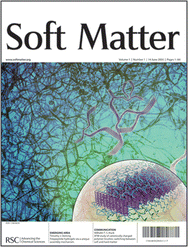Two new interdisciplinary journals complement Organic & Biomolecular Chemistry
As the traditional boundaries between chemistry, biology and physics become ever more indistinct, the Royal Society of Chemistry (RSC) is committed to publishing significant research from across the interfaces of these disciplines. In 2003, Organic & Biomolecular Chemistry was formed from the merger of Journal of the Chemical Society, Perkin Transactions 1 and Perkin Transactions 2 as a forum for all organic chemists working in established areas and also at the interface with biology, medicine and materials science. This has proved to be very successful in the two years since the journal's launch, and in line with the RSC's commitment to disseminating work at science interfaces we are very pleased that subscribers to Organic & Biomolecular Chemistry will now receive two further benefits. This year sees the launch of two exciting new interdisciplinary journals to complement the RSC's existing portfolio, and subscribers to Organic & Biomolecular Chemistry will have free online access to both journals. Molecular BioSystems will be hosted in print in Chemical Communications, and will appeal to those working at the interface between biology and chemistry while Soft Matter will be similarly associated with the Journal of Materials Chemistry and looks at soft materials in physics, chemistry and biology.The first issue of Molecular BioSystems
(http://www.molecularbiosystems.org)
Articles in the first issue of Molecular BioSystems include Reviews from Professor Herbert Waldmann on the application of protein structure similarity clustering in developing focussed libraries of protein ligands (p. 36) and from Professor Kazunari Taira on functional gene-discovery systems based on libraries of hammerhead and hairpin ribozymes and short hairpin RNAs (p. 27). Primary research includes the synthesis of covalent DNA–protein conjugates by expressed protein ligation (p. 64) and a Communication on affinity purification of RNA polymerase (p. 53).
Launching in June, Soft Matter
(http://www.softmatter.org)
The first issue of Soft Matter includes a Review by Dr Ian Hamley on nanoshells and nanotubes from block copolymers (DOI: 10.1039/b418226j), an Opinion from Professor Richard Weiss about the use of gels in art conservation (DOI: 10.1039/b501033k), and an Emerging Area by Professor Tim Deming on peptide hydrogels (DOI: 10.1039/b500307e). Primary research includes a Communication from Dr Wilhelm Huck about polymer brushes that switch between hard and soft matter (DOI: 10.1039/b502421h) and a Full Paper by Professor Karen Wooley on the solution and surface assembly of shell crosslinked nanoparticles (DOI: 10.1039/b417653g). The inaugural issue also includes a Comment from the Nobel Laureate Pierre-Gilles de Gennes on the future and origins of soft matter (DOI: 10.1039/b419223k). Many Advance Articles are available now on the website: Organic & Biomolecular Chemistry subscribers can read these and future articles in Soft Matter free online.
Organic & Biomolecular Chemistry continues to attract and publish excellent chemical biology and soft materials research of relevance to its scope; submissions are welcome at http://www.rsc.org/resource. Molecular BioSystems provides a new forum for the publication of novel work at the interface between chemistry and the -omic sciences and systems biology, and Soft Matter will promote the communication of fundamental science underpinning the properties and applications of soft matter. We encourage you to access both these new journals as soon as possible.
With very best wishes,
Professor Ben Feringa (Chair, Organic & Biomolecular Chemistry Board)
Dr Caroline Evans (Editor, Molecular BioSystems)
Dr Carol Stanier (Editor, Soft Matter)
| This journal is © The Royal Society of Chemistry 2005 |


